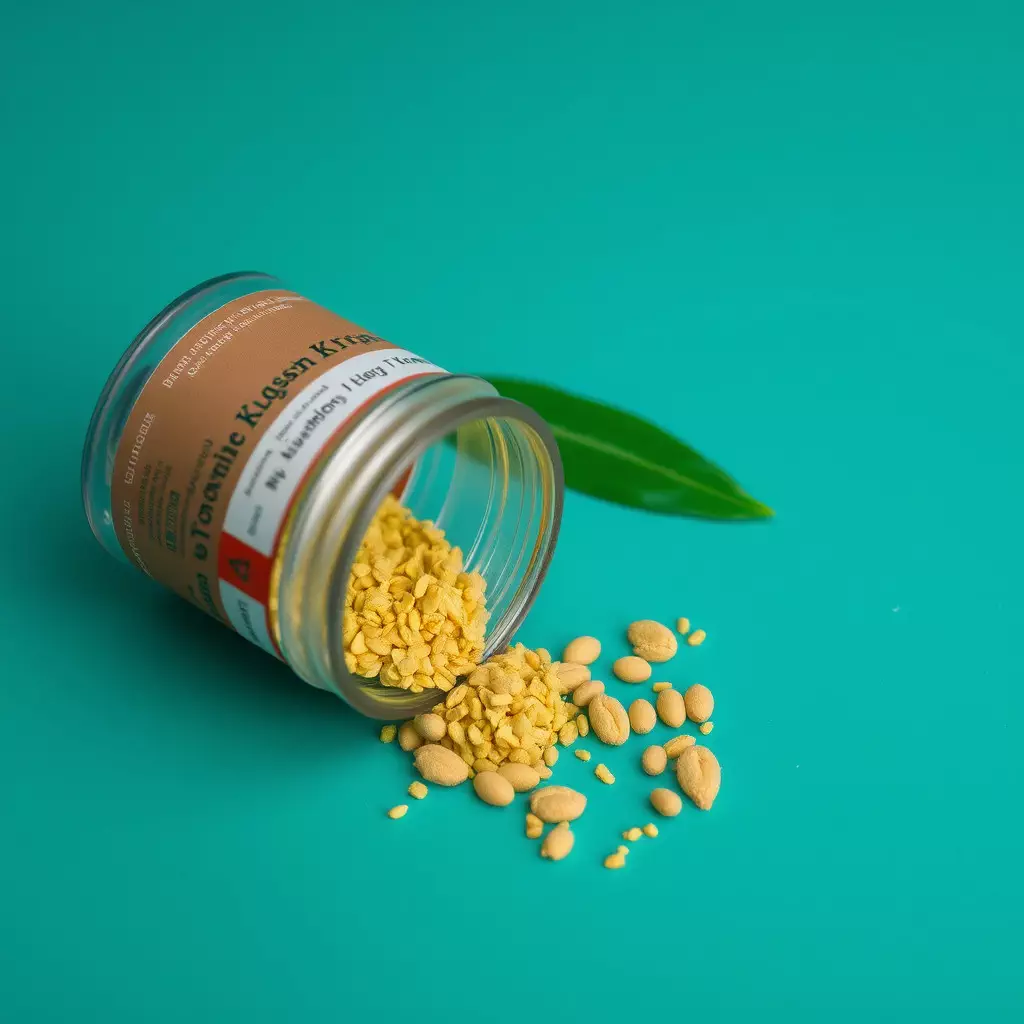This section discusses how natural supplements like kratom and coffee can be integrated into mental toughness training to enhance cognitive function and emotional regulation. Both substances have stimulatory properties and are related through their ability to influence mood and alertness, potentially aiding in mental endurance and performance. Kratom, with its alkaloids mitragynine and 7-hydroxymitragynine, has historically been used for mood elevation and shares some effects with coffee's caffeine, though their mechanisms of action can differ. For individuals interested in incorporating these substances into their mental conditioning routines, it's crucial to consume them responsibly, considering individual responses and the benefits and risks involved. The unique combination of kratom and coffee might offer distinct advantages in demanding situations. When using kratom, particularly the Maeng Da strain for its stimulating and focus-promoting properties, it's important to start with a low dose, optimize dosing based on personal reaction, and integrate it with a comprehensive regimen that includes physical activity, meditation, cognitive exercises, a healthy diet, and adequate sleep. Regular assessment of cognitive performance is necessary to ensure that kratom supports, rather than overshadows, the overall mental training program. It's also important to note the legal status of kratom can vary by region and professional advice should be sought before use. The key to safely and effectively using these substances lies in a well-informed, personalized approach that prioritizes safety and individual needs.
Exploring the intersection of mental fortitude and natural stimulants, this article unravels the synergistic potential between mental toughness training and the use of kratom, a plant traditionally valued for its stimulating effects. Akin to coffee consumption, kratom’s relationship with cognitive resilience is a burgeoning topic of interest for those seeking performance enhancements without relying on synthetic alternatives. We delve into how kratom can be strategically integrated into conditioning routines to bolster mental stamina, drawing parallels to the well-known benefits of coffee and providing insights into its role in enhancing both physical and mental endurance.
- Unpacking the Synergy Between Mental Toughness Training and Kratom: Understanding Its Relation to Coffee Consumption
- Enhancing Cognitive Resilience: Strategies for Integrating Kratom into Your Mental Conditioning Routine
- The Role of Kratom in Performance Enhancement: Bridging the Gap Between Mental Fortitude and Natural Stimulants like Coffee
Unpacking the Synergy Between Mental Toughness Training and Kratom: Understanding Its Relation to Coffee Consumption

Mental toughness training often emphasizes the cultivation of resilience, focus, and a strong mental fortitude to overcome challenges. One intriguing aspect of this training involves the use of natural supplements that can enhance cognitive function and emotional regulation. Among these, the relationship between kratom and coffee consumption has garnered attention, particularly in the context of mental endurance and performance enhancement. Kratom, a mitragynoid plant with alkaloids similar to those found in coffee, has been traditionally used for its stimulatory effects. Is kratom related to coffee? While they come from different sources, both substances share mechanisms that can influence mood and alertness. In the realm of mental toughness training, participants may explore how moderate consumption of these substances can complement their regimen. For instance, kratom’s alkaloid mitragynine, which shares structural similarities with adenosine receptors, can potentially modulate neurotransmitters that play a role in mood regulation, much like caffeine from coffee does. This synergy between kratom and coffee consumption may offer a unique advantage for individuals seeking to enhance their mental resilience during rigorous training sessions or high-pressure situations. However, it is crucial to approach the use of these substances with caution, adhering to recommended dosages and considering individual sensitivities, as both kratom and coffee have varying effects on different people. Proper education and understanding of the potential benefits and risks associated with their consumption are essential components of a comprehensive mental toughness training program.
Enhancing Cognitive Resilience: Strategies for Integrating Kratom into Your Mental Conditioning Routine

Kratom, a plant from Southeast Asia with leaves that contain compounds similar to those found in coffee, has garnered attention for its potential cognitive benefits. When integrated into a mental conditioning routine, kratom can play a role in enhancing cognitive resilience. The alkaloids present in kratom, particularly mitragynine and 7-hydroxymitragynine, interact with the body’s opioid receptors, which can influence mood and mental energy levels. To effectively incorporate kratom into your mental toughness training, it’s important to approach its use with a strategic plan.
Firstly, consider the strains of kratom carefully; each strain has different effects. Maeng Da, for instance, is known for its stimulating and focus-enhancing properties, which can be beneficial for cognitive tasks. Secondly, dose optimization is crucial. Start with a low dose to gauge your body’s response before gradually increasing if necessary. It’s also essential to maintain a balanced routine that includes physical exercise, meditation, and other mental exercises to support overall cognitive health. Additionally, pairing kratom with a healthy diet and adequate sleep can further enhance its effects on mental fortitude. Regular monitoring of your cognitive performance and adjustments to your kratom intake are necessary to ensure you’re achieving the desired resilience without overstepping your limits. Users should be aware that while kratom may offer cognitive support, it should complement a holistic approach to mental conditioning, not replace it.
The Role of Kratom in Performance Enhancement: Bridging the Gap Between Mental Fortitude and Natural Stimulants like Coffee

Kratom, a plant-based substance derived from the leaves of Mitragyna speciosa, shares some commonalities with coffee, which can be beneficial for individuals seeking to enhance their mental toughness and performance. Both substances contain compounds that interact with the brain’s receptors, influencing mood and energy levels. While coffee primarily stimulates the central nervous system through caffeine, kratom’s effects are more complex due to its alkaloid profile, which includes mitragynine and 7-hydroxymitragynine. These alkaloids contribute to kratom’s potential for mood elevation and cognitive enhancement, which can be advantageous in mental performance training.
Incorporating kratom into a regimen designed to cultivate mental resilience may help bridge the gap between the mental fortitude required for peak performance and the natural stimulant properties similar to those found in coffee. The nuanced effects of kratom can offer a sustained energy boost without the jittery side effects often associated with excessive caffeine intake. This makes it a compelling option for athletes, students, and professionals looking to maintain mental clarity and focus during extended periods of activity or high-stress situations. Users should approach the use of kratom with caution, as its effects can vary greatly depending on dose, strain, and individual physiology, and it is subject to legal restrictions in many regions. It is essential to consult with a healthcare provider before integrating kratom into any training or performance regimen to ensure safety and appropriateness for the individual’s specific needs and circumstances.
In conclusion, the synergistic relationship between mental toughness training and the incorporation of kratom, a natural stimulant often associated with coffee, presents a compelling avenue for enhancing cognitive resilience. The strategies outlined in this article provide a framework for integrating kratom into one’s conditioning routine to bolster performance and fortitude. While the is kratom related to coffee question has been explored, it’s clear that both substances can play a role in mental training regimens. It’s important for individuals to approach this integration with caution, considering the unique effects of kratom and its interaction with one’s personal physiology. As such, careful consideration should be given to dosage, frequency, and the individual’s overall well-being when combining these natural stimulants as part of a mental toughness training program. With responsible use and informed application, the potential benefits for cognitive resilience and performance enhancement can be realized without compromising safety or efficacy.






